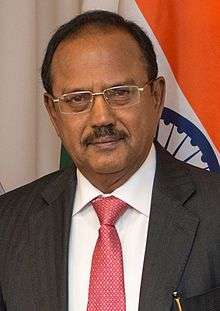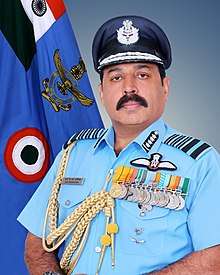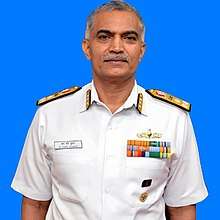Defence Planning Committee
The Defence Planning Committee is a senior decision-making organisation created on 19 April 2018 by the Government of India to facilitate "comprehensive" planning for the defence forces besides focussing on military doctrines to deal with emerging security challenges for India.[1]
| Committeee overview | |
|---|---|
| Formed | 19 April 2018 |
| Jurisdiction | India |
| Minister responsible | |
| Deputy Minister responsible |
|
| Committeee executive |
|
| Parent department | Ministry of Defence, Government of India |
History
The Defence Planning Committee was notified by the Ministry of Defence (MoD) in April 2018, the National Security Adviser (NSA) was appointed as the chairperson of the committee, with the chairperson, Chiefs of Staff Committee, three service chiefs (Chief of the Army Staff, Chief of the Air Staff and Chief of the Naval Staff), defence, foreign and expenditure secretaries being its members and the chief of the Integrated Defence Staff (CIDS) being its member-secretary,[2][3][4] the NSA was also given the mandate to co-opt members as they see fit. The Integrated Defence Staff headquarters at Kashmir House, New Delhi was to serve as the committee's secretariat.[2][3]
NSA Ajit Doval chaired the committee's first meeting on 3 May 2018, which was attended by the three chiefs of staff, and defence, foreign and expenditure secretaries.[5] The first meeting discussed the topics under mandate of DPC and ways to expedite modernisation of the armed forces and evolving a security strategy.[1]
Mandate
The mandate of DPC is manifold; the committee is empowered to "analyse and evaluate all relevant inputs relating to defence planning", which consists of—amongst others—"national defence and security priorities, foreign policy imperatives, operational directives and associated requirements, relevant strategic and security-related doctrines, defence acquisition and infrastructure development plans, including the 15-year Long-Term Integrated Perspective Plan (LTIPP), defence technology and development of the Indian defence industry and global technological advancement".[6][7][8]
The committee is also vested with the power of preparing different drafts, including—but not limited to—drafts on: "national security strategy, strategic defence review and doctrines; international defence engagement strategy; roadmap to build defence manufacturing eco-system; strategy to boost defence exports; and prioritised capability development plans for the armed forces over different time-frames in consonance with the overall priorities, strategies and likely resource flows."[6][7][8]
The DPC answers to—and submits its reports to—the Raksha Mantri (Minister of Defence), currently Rajnath Singh.
According to the notification issued by Indian Government the DPC will have several mandates namely to[5]
- Prepare a draft National Security Strategy.
- Develop a capability development plan.
- Work on defence diplomacy issues.
- Improving defence manufacturing ecosystem in India.
DPC would also analyse all inputs relating to the defence planning and foreign policy imperatives. The committee would focus on the defence acquisition and infrastructure development plans including the 15-year long integrated perspective plan. The committee will work for the development of Indian defence industry and technology advancements.[1]
Organisation
Four sub-committees on: policy and strategy, plans and capability development, defence diplomacy and defence manufacturing ecosystem come under the DPC; the terms of reference and membership of the sub-committees are finalised separately. Specific issues are managed by the committee through its sub-committees.
DPC is chaired by the National Security Adviser, with the service chiefs, defence, expenditure and foreign secretaries being its members and the IDS chief being its member-secretary. The Integrated Defence Staff headquarters in New Delhi serves as the secretariat for the committee. The DPC submit its reports to the Raksha Mantri (Minister of Defence).[5]
Members
| Position | Incumbent | Portrait | Ex-officio status |
|---|---|---|---|
| National Security Adviser | Ajit Doval, IPS (retd.) |  |
Chairperson |
| Permanent Chairperson, Chiefs of Staff Committee and Chief of Defence Staff | General Bipin Rawat | .jpg) |
|
| Chief of the Naval Staff | Admiral Karambir Singh |  |
Member |
| Chief of the Army Staff | General Manoj Mukund Naravane | .jpg) | |
| Chief of the Air Staff | Air Chief Marshal Rakesh Kumar Singh Bhadauria |  | |
| Defence Secretary | Ajay Kumar, IAS | %2C_Dr._Ajay_Kumar%2C_in_New_Delhi_on_July_04%2C_2019_(cropped).jpg) | |
| Expenditure Secretary | T. V. Somanathan, IAS | ||
| Foreign Secretary | Vijay Gokhale, IFS | ||
| Chief of Integrated Defence Staff | Vice Admiral R. Hari Kumar |  | Member-Secretary |
Reception
Former Chief of the Air Staff, Air Chief Marshal Srinivasapuram Krishnaswamy—who was a part of the Naresh Chandra task-force—praised the move, calling it "an outstanding move";[9] but, criticised the government's decision to not include the Defence Production Secretary and Defence Research and Development Organisation (DRDO) chairperson in the committee, dubbing them "key players" in the government's flagship Make in India initiative.[9]
Amit Cowshish, a former Financial Adviser (Acquisition) in the Ministry of Defence, criticised the committee's "wide mandate", calling it an obstacle from "swift reform".[10] Cowshish also criticised the timing of DPC's creation, calling it a step taken "four years too late",[10] further adding that the creation of the committee called "into question the relevance of the existing long-term, five-year and annual plans of the armed forces".[10]
Mohinder Puri, a former deputy chief of the army, praised the government's decision, saying, "on the face of it, the DPC looks good, as it takes the overall view of national and international security".[9] A The Week column questioned the decision of naming the NSA as DPC's chairperson, arguing that NSA is already overworked as it is being the PM's special representative on border issues with China and chief of the executive council of Nuclear Command Authority.[9]
A retired army brigadier criticised the government's decision of not including the Home Secretary in the committee.
References
- "Defence Planning Committee holds first meeting; decides to make action plan to deal with security challenges—The meeting, chaired by National Security Adviser Ajit Doval, also discussed ways to expedite modernisation of the armed forces and evolving a security strategy for the country". The Indian Express. Press Trust of India. 4 May 2018.
- Singh, Sushant (19 April 2018). "NSA will chair panel set up for new security roadmap; Foreign, Defence Secys its members". The Indian Express. New Delhi: Indian Express Group. OCLC 70274541. Retrieved 6 June 2018.
- "NSA-headed committee for higher defence management". The Hindu. Special Correspondent. New Delhi: N. Ram. 19 April 2018. ISSN 0971-751X. OCLC 13119119. Retrieved 6 June 2018.CS1 maint: others (link)
- Ahmed, Ali (26 May 2018). "The Doval Scorecard". Economic and Political Weekly. Sameeksha Trust. 53 (21). ISSN 0012-9976. LCCN sa67002009. OCLC 46735231.
- "Doval chairs first meet of defence panel". The Hindu. 4 May 2018. Retrieved 4 May 2018.
- Behera, Laxman Kumar (19 April 2018). "Creation of Defence Planning Committee: A Step towards Credible Defence Preparedness | Institute for Defence Studies and Analyses". Institute of Defence Studies and Analyses. Retrieved 12 January 2020.
- Joshi, Manoj (22 August 2018). "Scraping the bottom of the barrel: Budgets, organisation and leadership in the Indian defence system". Observer Research Foundation. Retrieved 12 January 2020.
- Gupta, Shishir (19 April 2018). "India to create super-committee for defence planning". Hindustan Times. New Delhi. ISSN 0972-0243. OCLC 231696742. Retrieved 12 January 2020.
- Sagar, Pradip R (3 June 2018). "Committed to synergy". The Week. Jacob Mathew. Retrieved 6 June 2018.
- Cowshish, Amit (24 May 2018). "A blunt instrument". The Indian Express. OCLC 70274541. Retrieved 12 January 2020.